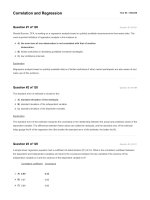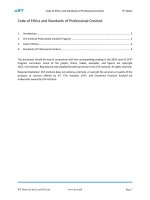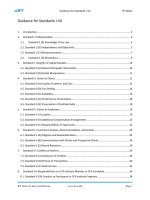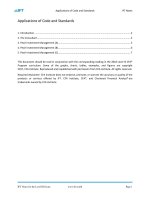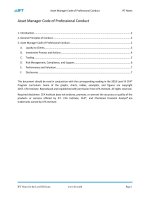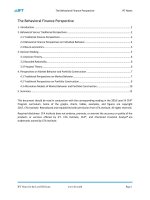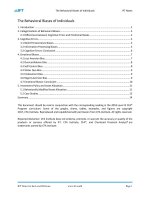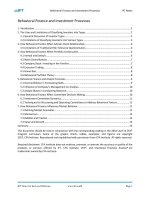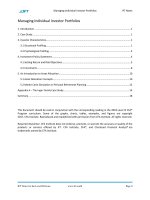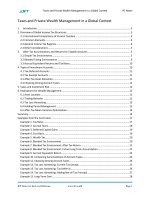CFA 2018 level 3 schweser practice exam CFA 2018 level 3 question bank 01 ethics answers
Bạn đang xem bản rút gọn của tài liệu. Xem và tải ngay bản đầy đủ của tài liệu tại đây (20.23 KB, 3 trang )
ETHICS ANSWERS
Part A
Yes, Anderson must not divulge client information to anyone outside his firm unless required to
do so by law or the client permits disclosure. This is a violation of the standard Duties to
Clients—Preservation of Confidentiality.
Sample Scoring Key:
1 point for answering yes.
2 points for the explanation.
0 points if answered no.
Candidate discussion: Anderson violated client-member confidentiality with Peterson. This
break in confidentiality is a violation of Standard III(E) Duties to Clients—Preservation of
Confidentiality which states, “Members and Candidates must keep information about current,
former, and prospective clients confidential unless, (1) Disclosure is to fellow employees for
client purposes, (2) disclosure is required by law, or (3) the client or prospective client permits
disclosure of the information.”
Part B
No, Anderson did what is required by gathering and documenting pertinent client information.
Meetings and written forms are normal, as is working with confidential client information with
other members of their firm.
Sample Scoring Key:
1 point for answering no.
2 points for the explanation.
0 points if answered yes.
Candidate discussion: There is no provision that would prohibit Anderson from gathering
information through the mail. Nor is there a provision prohibiting appropriate employees of an
investing management firm from working with confidential client information. Anderson was
meeting requirements of the Standards.
Part C
Yes, Anderson did not tell Peterson that he owns shares of Brown Company which is a violation
of the Standard relating to Conflicts of Interest. If advisers recommend assets they own, they
must disclose the ownership to their clients.
Sample Scoring Key:
1 point for answering yes.
1
2 points for the explanation.
0 points if answered no.
Candidate discussion: By Anderson not telling Peterson that he owns shares of Brown
Company this is a violation of Standard VI(A) Conflicts of Interest—Disclosure of Conflicts.
Best practice is for advisers to avoid owning the same types of assets they recommend. If they
recommend assets they own, they must tell their clients about the ownership.
Part D
Yes, the supervisor suggested how to break the law, which is a violation of the Standard relating
to Professionalism—Knowledge of the Law, which states that members must not knowingly
participate or assist in a violation of the law.
Sample Scoring Key:
1 point for answering yes.
2 points for the explanation.
0 points if answered no.
Candidate discussion:
The supervisor was encouraging a violation of the law, thus violating the Code and Standards
I(A) Professionalism—Knowledge of the Law, which states in part that members have violated
the standard if they knowingly participate or assist in a violation of the law. Anderson’s
supervisor assisted in a violation of the law by suggesting how best to break the law.
Part E
Anderson is required by the Code and Standards to dissociate from the illegal or unethical
situation. Other actions Anderson may need to take are: inform the firm's legal counsel and
compliance department, report the violation to the appropriate government agency or regulatory
agency if required to do so under applicable law.
Sample Scoring Key:
1 point for Anderson to dissociate from the situation
2 points for other actions Anderson may need to take
Candidate discussion: Even though Anderson’s employer is not a member of CFA Institute,
Anderson is still required by the Code and Standards to at least dissociate from the situation.
Other actions Anderson may need to take, depending upon the severity of the unethical behavior,
are: inform the firm's legal counsel and compliance department and report the violation to the
appropriate government agency or regulatory agency if required to do so under applicable law.
Normally he would report the activities to his supervisor, but in this case, the supervisor is part
of the problem.
2
Part F
Yes, reporting to the authorities is premature. If the activities are illegal, Anderson may need to
report to the authorities, but not without seeking qualified advice.
Sample Scoring Key:
1 point for answering yes.
2 points for the explanation.
0 points if answered no.
Candidate discussion: This is an unusually complicated situation in which the requirement to
seek more qualified advice is critical. Disclosing confidential information is a serious action. The
CFA readings are intended to make you realize that not all situations have simple, definitive,
immediate resolutions. They specifically explain that local law varies and may require reporting
the activities to appropriate authorities or it may require maintaining client confidentiality. To
report without a clear understanding of the situation is a violation.
3
